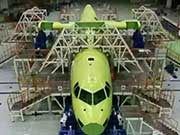


Shanghai Mayor Yang Xiong (R), Chinese Finance Minister Lou Jiwei (M) and K.V. Kamath, president of the New Development Bank(L), celebrate together as the New Development Bank, more commonly known as the BRICS Bank, was officially launched in Shanghai today. (Source:Shanghai Daily/Wang Rongjiang)
BEIJING, July 9 (Xinhua) -- With the launch of the BRICS New Development Bank (NDB), the BRICS mechanism has achieved substantial progress in pragmatic cooperation.
In the past, the BRICS -- Brazil, Russia, India, China and South Africa -- has not only boosted economic growth in its member states, and together generated about one fifth of the world GDP, but also contributed new ideas and strategies to global governance. Full story
SHANGHAI, July 21 (Xinhua) -- The New Development Bank (NDB) of BRICS opened in Shanghai on Tuesday to finance infrastructure projects, mainly in BRICS members.
BRICS countries are the world's major emerging economies: Brazil, Russia, India, China and South Africa. BRICS leaders signed an agreement to establish the bank during their sixth summit in Brazil in July, 2014. The bank will start operations at the end of this year or early in 2016.
Chinese Finance Minister Lou Jiwei, Shanghai Mayor Yang Xiong and NDB President K.V. Kamath from India attended the opening ceremony.
The NDB will supplement the existing international financial system in a healthy way and explore innovations in governance models, Lou said at a seminar following the ceremony.
Jim Yong Kim, President of the World Bank Group, said in a statement, "the New Development Bank joins a growing number of multilateral institutions - including the Asian Infrastructure Investment Bank (AIIB) - that are working to address the world's huge infrastructure needs. Emerging markets and low-income countries face an annual gap of 1 trillion to 1.5 trillion U.S. dollars in infrastructure spending."
"We are committed to working closely with the New Development Bank and other multilateral institutions, offering to share our knowledge and to co-finance infrastructure projects. These types of partnerships will be essential to reach our common goals to end extreme poverty by 2030, boost shared prosperity, and to reduce inequalities."
On the relations between the NDB and the AIIB, Lou said both the NDB, initiated by the five members of BRICS, and the AIIB proposed by China, showed how emerging economies could improve global infrastructure and reform global economic governance. The two will complement each other, as they are different in membership and have different directions. The global demand for infrastructure funding is huge, he said.
The first chair of the board of governors will be from Russia, the first chair of the directors from Brazil, and the first president from India. The bank was formerly set up at a meeting in Russia on July 7 this year with Kamath chosen as president.
Kamath is credited with turning ICICI Bank into one of India's largest private lenders during his 13 years as managing director and CEO. He spent several years at the Asian Development Bank and has served as non-executive chairman of both ICICI and Indian software giant Infosys
The NDB will have an initial authorized capital of 100 billion U.S. dollars, and initial subscribed capital of 50 billion U.S. dollars equally shared among the five founders.
Day|Week

 China starts assembly of world’s largest amphibious aircraft
China starts assembly of world’s largest amphibious aircraft PLA's only woman CBRN emergence rescue team
PLA's only woman CBRN emergence rescue team Stunning! Gorgeous girls practice yoga on 2,000-meter-high cliff
Stunning! Gorgeous girls practice yoga on 2,000-meter-high cliff PLA Air Force fighter aircraft in action
PLA Air Force fighter aircraft in action A glimpse of China's Zijinshan gold & copper mine
A glimpse of China's Zijinshan gold & copper mine Be an ageless goddess like them
Be an ageless goddess like them Hot figure show in SW China
Hot figure show in SW China Evolution of Chinese beauties in a century
Evolution of Chinese beauties in a century